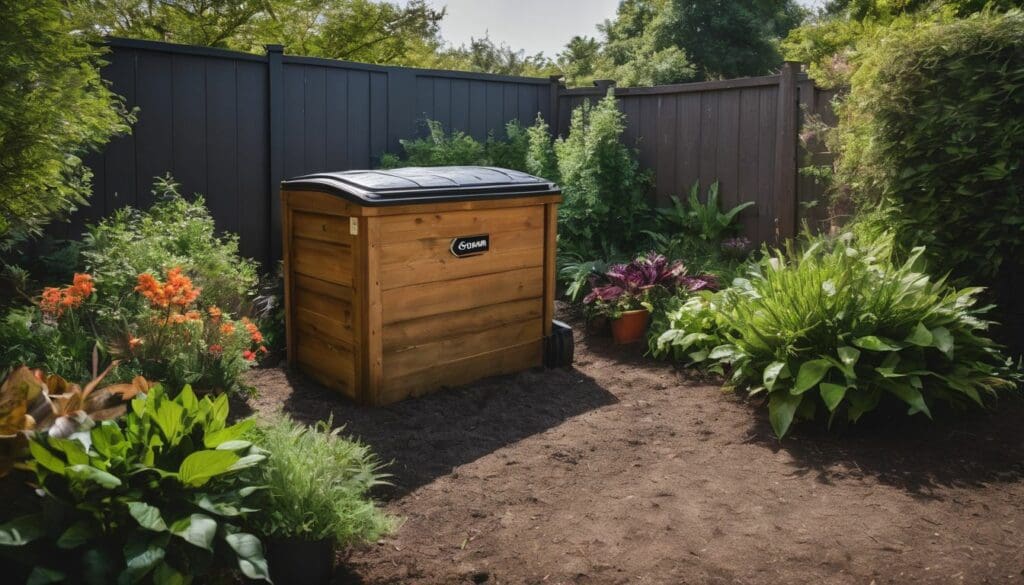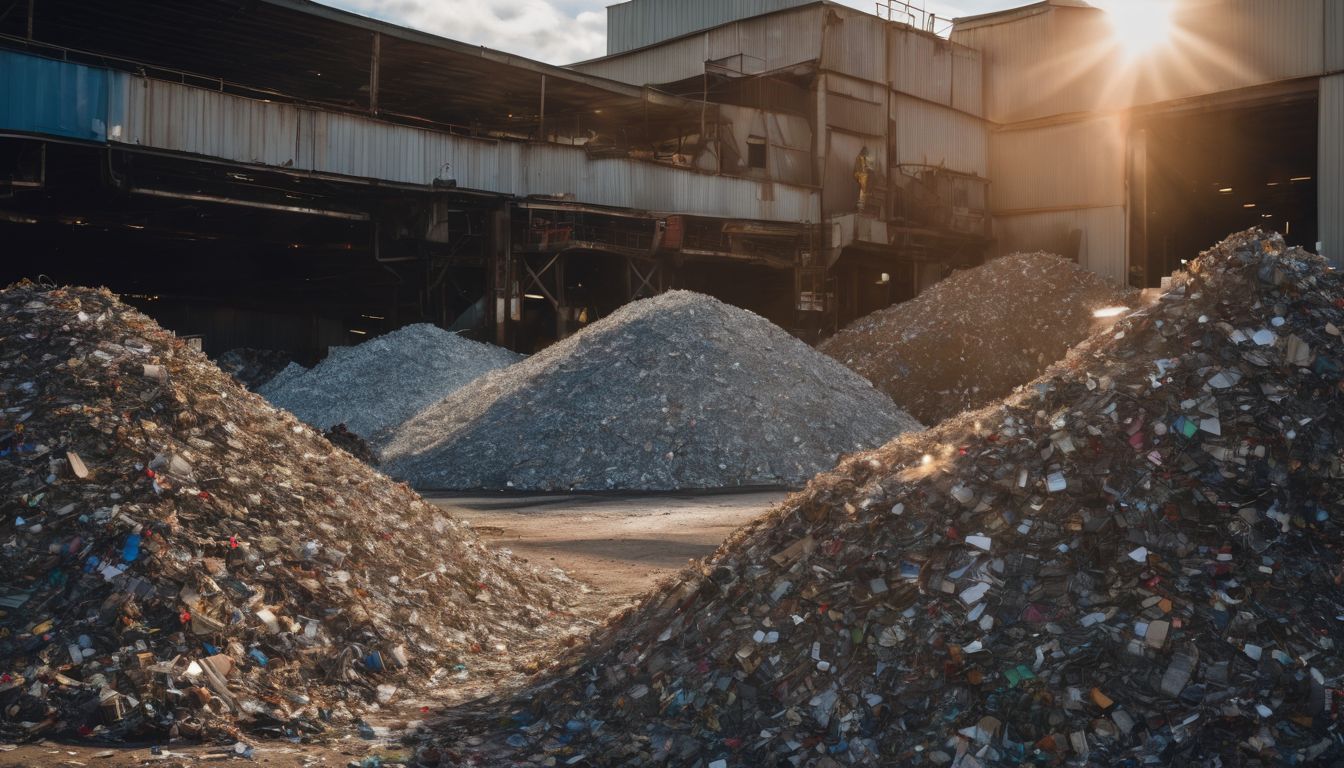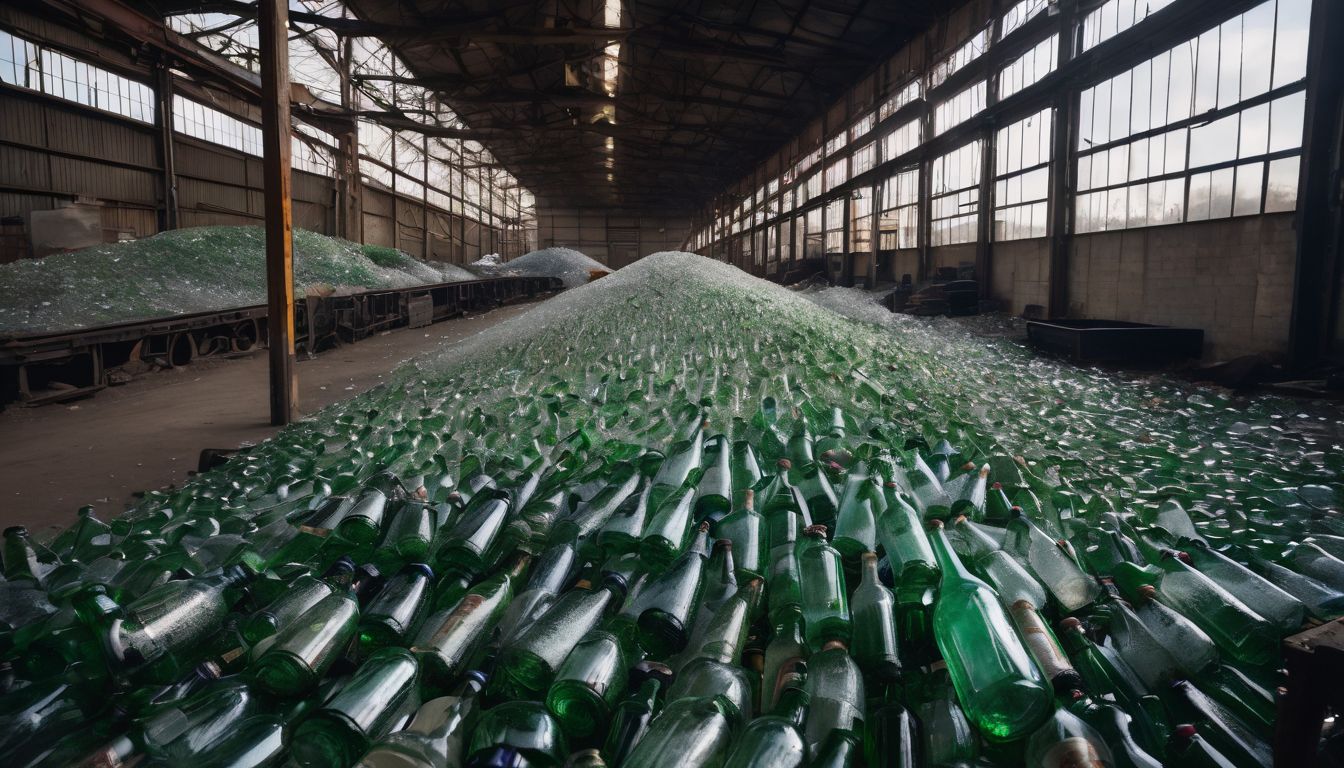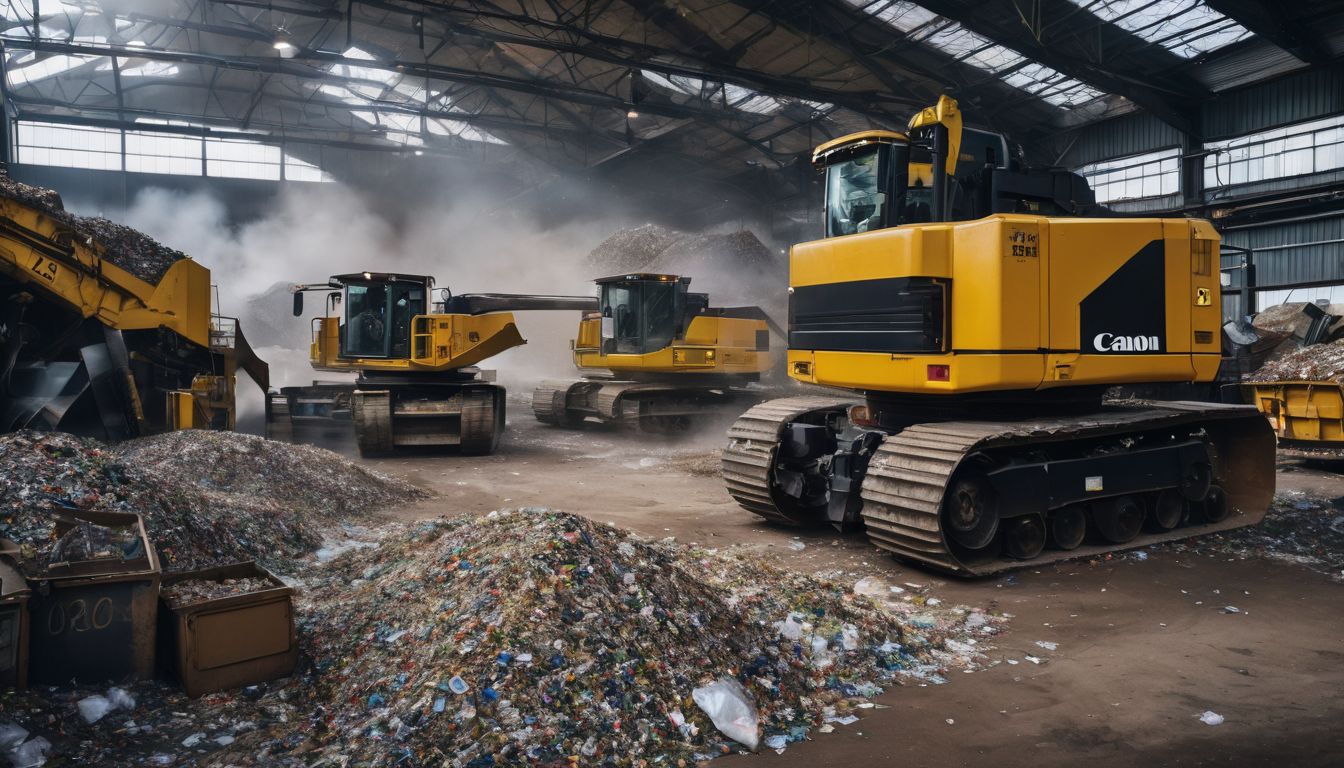Are you tired of seeing your bin fill up with kitchen scraps and garden waste? Composting is a natural process that transforms organic waste into valuable fertiliser. Our guide simplifies the art of composting at home, empowering you to reduce waste and enrich your soil.
Dig in for greener living!
Key Takeaways
- Composting at home transforms kitchen scraps and garden waste into valuable fertiliser, helping to reduce landfill waste and cut down on methane emissions, a potent greenhouse gas.
- A successful compost requires a balanced mix of green materials, which are rich in nitrogen like fruit and vegetable peelings, and brown materials which provide carbon such as dry leaves or shredded paper.
- Using finished compost improves soil quality by adding essential nutrients naturally without the need for chemical fertilisers, thus supporting healthier plant growth in gardens or yards.
- Troubleshooting common composting issues involves maintaining proper moisture levels, ensuring good aeration to avoid bad odours, and controlling pests by not including meat or dairy products in the pile.
- Home gardening techniques such as deep watering plants less frequently and using organic fertilisers can enhance garden health while complementing your composting routine.
What is Composting?
Composting transforms kitchen waste, yard debris, and other biodegradable materials into nutrient-rich soil. It’s a process that relies on microorganisms and soil organisms to break down organic matter into a substance that can enrich garden soil.
During decomposition, green materials like vegetable scraps provide nitrogen, while brown materials such as leaves and twigs offer carbon. These elements are key for composting by supporting the growth of beneficial bacteria and fungi.
This natural cycle of breaking down plant material mimics what happens in nature but speeds up the process in your own backyard compost pile. As these organic components decompose they turn into humus – a dark, crumbly product that improves soil structure and provides plants with essential nutrients.
Composting is an effective way to reduce your carbon footprint by recycling food scraps and yard trimmings instead of sending them to landfills where they take up space and release methane gas.
The Benefits of Composting at Home
Composting at home has numerous benefits, including reducing waste in landfills, producing nutrient-rich soil for gardens, and reducing the need for chemical fertilisers. It also plays a role in fighting climate change by promoting sustainable waste reduction practices.
Reduces waste in landfills
Composting at home reduces waste in landfills by diverting organic materials like fruit and vegetable scraps, yard clippings, and eggshells from the trash. Instead of contributing to overflowing landfills, these biodegradable items are transformed into nutrient-rich soil through the composting process.
By doing so, you actively participate in reducing the environmental burden of landfill waste while creating a valuable resource for your garden or yard.
Furthermore, by composting at home, you contribute to minimising methane emissions generated by decomposing organic matter in landfills. This proactive action aligns with sustainable living practices and promotes environmental sustainability within your community.
Produces nutrient-rich soil
Composting creates nutrient-rich soil that provides essential nourishment for garden plants. Yard waste and green waste break down into a rich, dark substance packed with nitrogen, ideal for fertilising gardens.
Nutrient-rich soil promotes healthy plant growth while reducing the need for chemical fertilisers, supporting environmentally friendly gardening practices.
By composting at home, you can actively contribute to minimising landfill waste and promoting sustainable gardening. The process of producing nutrient-rich soil through composting offers a simple yet effective way to support conservation efforts and environmental sustainability.
Reduces the need for chemical fertilisers
Composting reduces the need for chemical fertilisers. By enriching soil with organic matter, compost provides essential nutrients to plants, promoting healthier growth without relying on synthetic products.
This eco-friendly approach not only benefits your garden but also contributes to a more sustainable environment.
Choosing to compost at home can significantly reduce the demand for commercial fertilisers, contributing positively to environmental conservation efforts and supporting a healthier ecosystem overall.
Helps fight climate change
Reducing the need for chemical fertilisers decreases greenhouse gas emissions and contributes to overall environmental sustainability. Efficient decomposition of organic waste in a compost pile reduces methane production, a potent greenhouse gas that significantly impacts climate change.
By diverting organic materials from landfills and facilitating their natural breakdown into nutrient-rich soil, home composting plays a crucial role in mitigating climate change by reducing carbon emissions.
Converting food scraps and yard waste into nitrogen-rich garden compost through home composting significantly decreases the emission of harmful gases associated with conventional waste disposal methods.
Getting Started with Composting
To start composting at home, it’s important to research different methods and choose a suitable compost bin. Collecting green and brown materials, layering the pile correctly, and managing it effectively are crucial steps in the process.
Researching different methods
When starting your composting journey, it’s essential to research different methods before diving in. Assess the space you have available, how much time you can dedicate to the process, and what materials are easily accessible to you.
Compare traditional bin composting with vermiculture or trench composting to find the method that best suits your needs and lifestyle. Understanding the various approaches will help you make an informed decision and set up a successful composting system at home.
To ensure success when researching different methods of composting, consider factors such as climate, available organic materials, and desired end products. It’s important to choose a method that aligns with your environmental goals while being practical for your living situation.
Choosing a compost bin
When selecting a compost bin, consider the available space and the amount of organic waste generated. Look for bins made from durable, weather-resistant materials like plastic or wood to ensure longevity.
Consider the type of composting you want to do – whether it’s traditional composting, hot composting, or vermicomposting (using worms) – and choose a bin that suits your preferred method.
Also, make sure the bin has good ventilation to help with decomposition and avoid odour.
Collecting green and brown materials
To create nutrient-rich compost for your garden, you’ll need to collect a mix of green and brown materials. Here’s what you should gather:
- Green materials provide nitrogen – items like grass clippings, fruit and vegetable scraps, coffee grounds, and eggshells.
- Brown materials add carbon – including dry leaves, straw, wood shavings, and shredded cardboard or newspaper.
- Avoid adding meat, dairy products, or pet waste to prevent odour and pest issues.
- Aim for a balanced mix of roughly 50% green and 50% brown materials by volume for efficient decomposition.
- Chop or shred larger pieces to speed up the composting process.
Layering and managing the pile
To create nutrient-rich soil in your compost, start by layering green and brown materials. Add a layer of nitrogen-rich green materials such as fruit and vegetable scraps or grass clippings. Then, add a layer of carbon-rich brown materials like dried leaves, straw, or shredded paper. Mix the layers with a pitchfork or shovel every week to aerate the pile and speed up decomposition. Maintain the pile’s moisture level by watering it when necessary to create optimal conditions for composting. Keep an eye on the temperature and adjust the pile accordingly to ensure efficient decomposition. Finally, harvest finished compost from the bottom of your pile as needed for use in your garden or yard.
Troubleshooting Common Composting Issues
Keep an eye on moisture levels, odours, and pests to ensure successful composting. Read more about how to overcome these common issues by visiting our blog for helpful tips and tricks!
Too wet
If your compost pile is too wet, it can become smelly and attract unwanted pests. To fix this issue, add more brown materials like dry leaves or newspaper to the pile. Turning the compost regularly will also help aerate it and reduce excess moisture.
By taking these simple steps, you can maintain a healthy balance in your compost pile and prevent it from becoming too soggy.
Moving on to another common issue with composting – bad odour.
Bad odour
To combat bad odour in your compost pile, ensure that it is properly aerated. Turning the compost regularly will help prevent anaerobic conditions, reducing the unpleasant smell. Additionally, adding more dry brown materials like twigs or leaves can also help absorb excess moisture and reduce odour.
Maintaining a proper balance of green and brown materials will aid in keeping the compost pile smelling fresh and earthy.
It’s essential to address bad odour promptly to encourage healthy decomposition and discourage pests. By taking simple steps to manage this issue, you can maintain an efficient and effective home composting system, while minimising any negative impact on your environment.
Pest control
Dealing with pests in your compost pile can be a common challenge. To prevent pests such as rodents and insects from being attracted to your compost, it’s important to avoid adding meat, dairy, or oily foods which can attract unwanted visitors.
Additionally, regularly turning or aerating the compost can deter pests and help the decomposition process.
Another effective method is to cover the compost heap with a tarp or secure lid to restrict access for pests. Ensuring that the compost reaches an optimal temperature of 120-160°F (49-71°C) will also help eliminate any unwanted pests while promoting proper decomposition.
What to do with weeds
To manage weeds in compost, chop them into small pieces before adding them to the pile. This helps speed up decomposition and reduces the chances of regrowth. Avoid adding weeds with mature seeds to prevent them from spreading in your garden when using finished compost.
Another option is to create a separate hot compost pile exclusively for weed disposal. This method ensures that any seeds or roots are destroyed during the high-temperature process.
Consider covering the weed-infested areas with a thick layer of mulch after weeding to prevent their return and provide additional brown material for your compost.
Using Finished Compost
Once your compost is ready, it can be used to improve the quality of soil in your garden or yard. This nutrient-rich material can also serve as a natural fertiliser for your plants, helping them thrive without the need for chemical alternatives.
Improving soil quality
Improving soil quality is a key benefit of using finished compost. The nutrient-rich soil created through composting provides essential elements for plants to thrive, promoting healthier growth and increased yield in home gardens and yards.
Compost also helps to improve soil structure, ensuring better water retention and drainage, which contributes to overall plant health.
Furthermore, the use of nutrient-rich soil from compost reduces the need for chemical fertilisers, supporting environmentally friendly gardening practices. By integrating this natural alternative into your gardening routine, you are actively contributing to conservation efforts while cultivating a sustainable environment for plants to flourish without harming the ecosystem.
Fertilising garden and yard
After your compost is ready, use it to fertilise your garden and yard. Spread a layer of the nutrient-rich soil over flower beds, vegetable patches, or around trees and bushes. The compost will improve soil quality by adding essential nutrients that promote healthier plant growth.
Applying finished compost also helps retain moisture in the soil and reduces the need for chemical fertilisers. This benefits both your plants and the environment, as it minimises harmful chemicals reaching water sources or disrupting ecosystems.
Embracing this natural gardening practice promotes sustainability while supporting a thriving garden landscape through organic means.
Home gardening tips and tricks
To keep your garden healthy and thriving, follow these tips and tricks:
- Choose the right plants for your climate and soil to ensure they thrive.
- Water your plants deeply but less frequently to encourage deep root growth.
- Use organic fertilisers to feed your plants and improve soil health without harmful chemicals.
- Mulch around plants to retain moisture, suppress weeds, and regulate soil temperature.
- Rotate crops each season to prevent soil depletion and reduce the risk of pests and diseases.
Conclusion
In conclusion, home composting is a simple yet impactful way to reduce waste and create nutrient-rich soil. By choosing the right method and materials, anyone can start their own composting process.
With a little effort, it’s possible to make a positive environmental impact while also benefitting from healthier gardens and yards. Composting at home contributes directly to reducing carbon footprints and promoting sustainable living.
FAQs
1. What is composting at home?
Composting at home means turning kitchen and garden waste into nutrient-rich soil that can help plants grow better.
2. Why should I start composting at home?
You should start composting to reduce your waste and create nutrient-rich soil for your garden, which is great for the environment.
3. What kind of materials do I need to make good compost?
For good compost, you’ll need a mix of green (nitrogen-rich) items like vegetable scraps and brown materials like leaves or newspaper.
4. Can I use my homemade compost in any type of garden?
Yes! You can use your homemade, nutrient-rich soil in flower beds, vegetable gardens, and even for potted plants to make them thrive.





